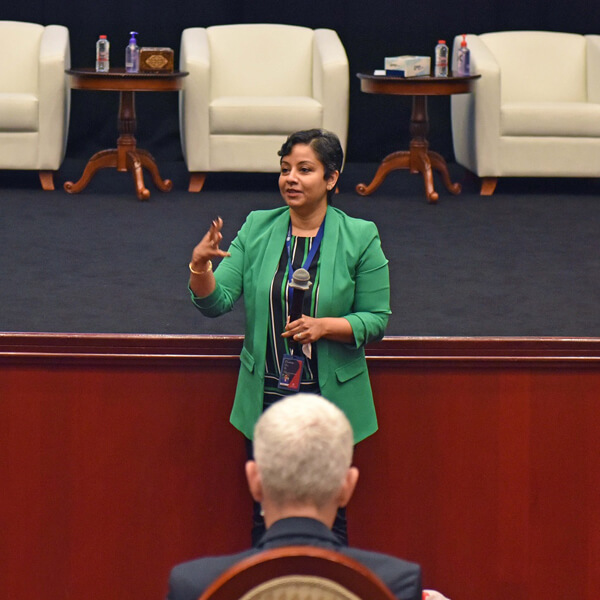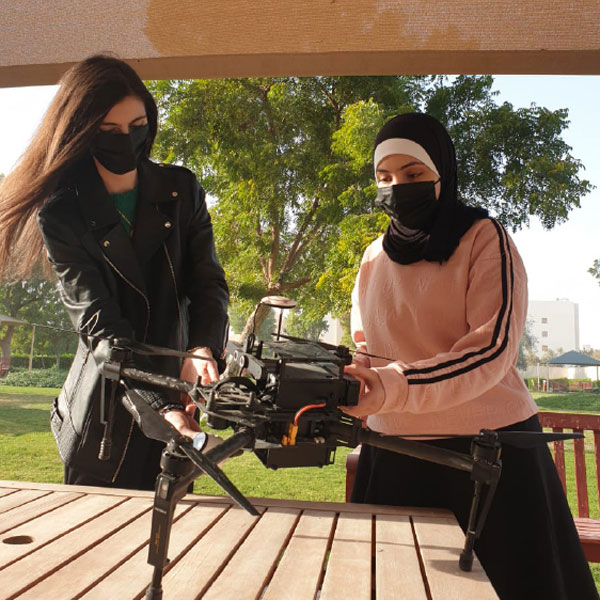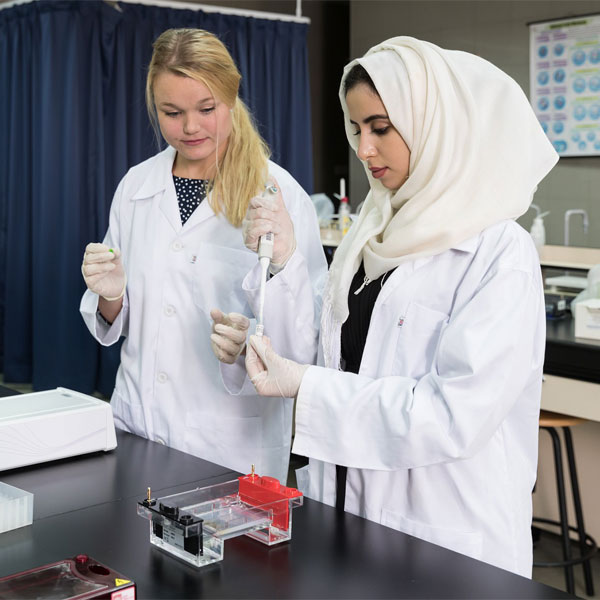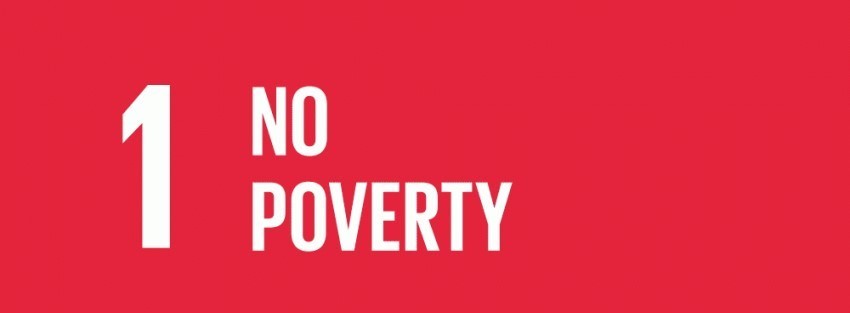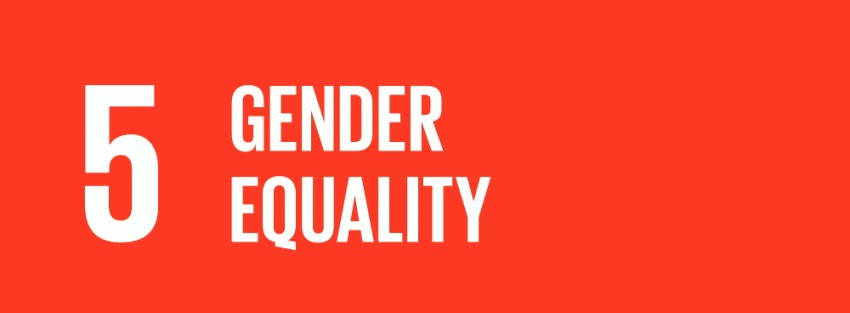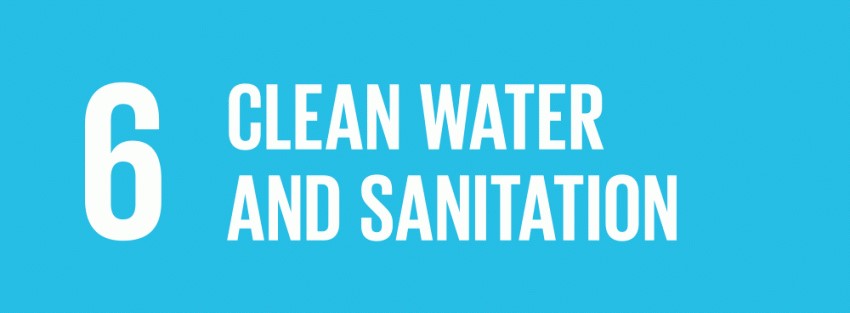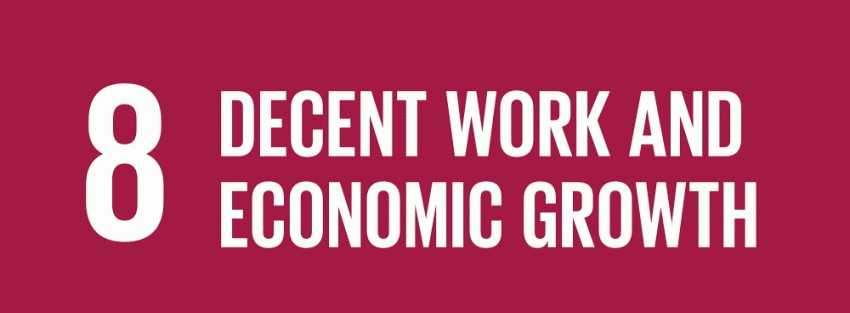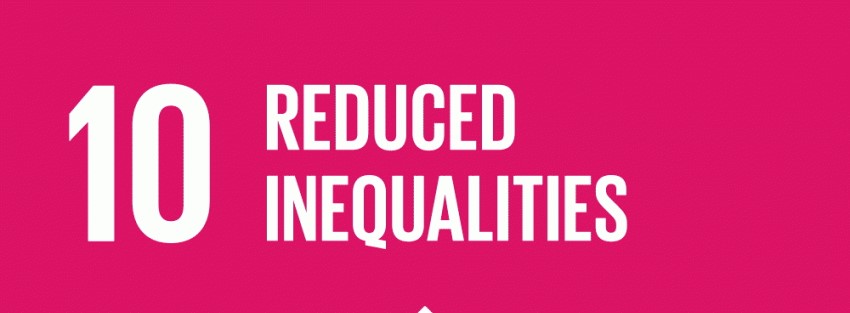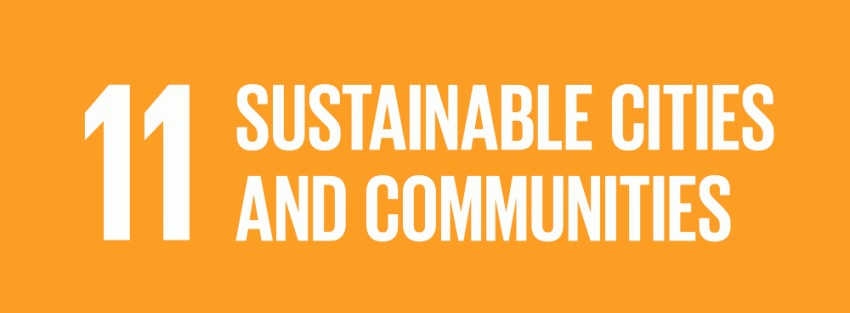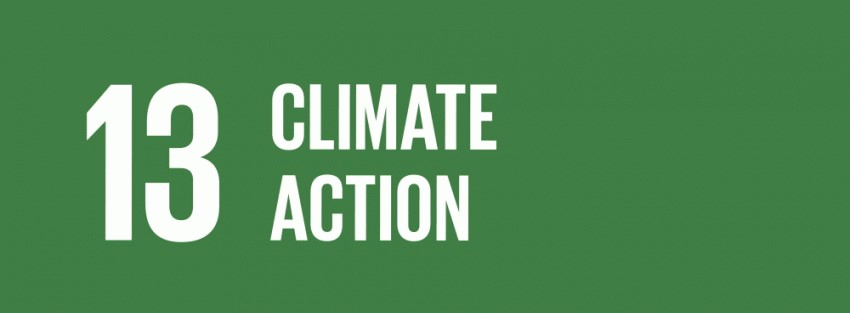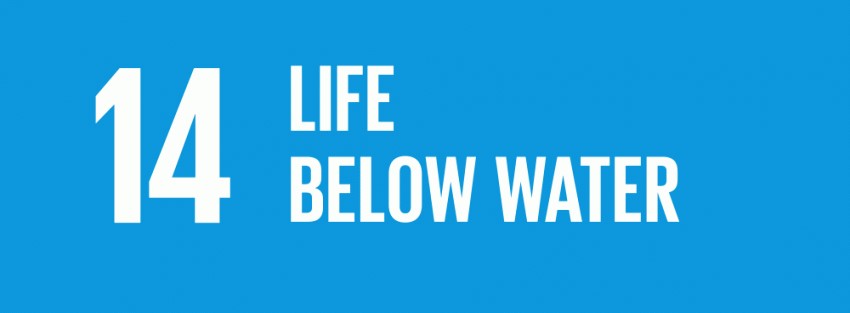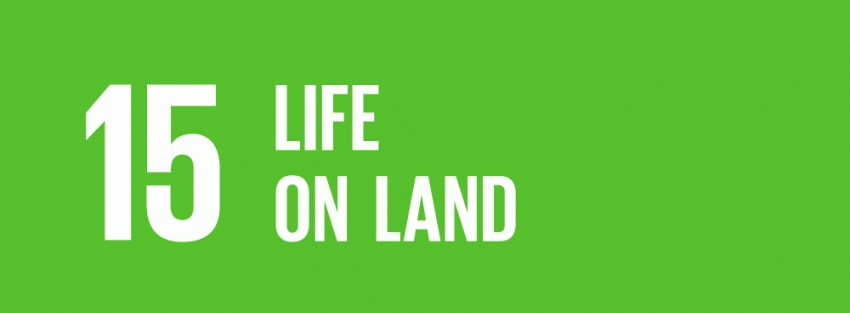SDG 1.3.4
Programmes to assist students who fall into the bottom 20% of household income group to complete their studies
Sustained economic growth cannot be achieved without social inclusion as the whole of society has a role to play in the development of a country. Federal Law No. 13 of 1972 and its amendments by the law (No.2) in 2001 was issued by the Ministry of Community Development.
1.3.4 Does your university as a body have programmes to assist students who fall into the bottom 20% of household income group in the country to successfully complete their studies?
Academic Success Center
Excellence happens here.
At the ASC we strive for success beyond the classroom.
Our goal is to help students develop effective learning strategies to reach their academic potential and earn the grades they want and need!
Expert academic help
What We Are About
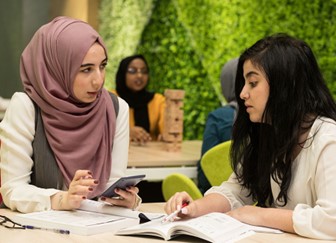
The Academic Success Center provides expert academic help for all ADU students.
ASC provides:
- One-on-One Tutoring
- Drop-in Hours
- Group Tutoring
- Workshops and Competitions
- Assistance with Research and Projects
- Problem Solving and Creative Writing
- Creating and Polishing Academic Knowledge and a lot more….
Begin Your Journey to Success Now
All services are free of charge
Join the Mentor Community
Be who you needed when you were a freshman at ADU.
Expert academic help
Peer Mentors Wanted
We are looking for students from all majors with experience and skills others can benefit from.
Please consider volunteering!
Benefits of Mentoring:
- Promotes confidence and motivation
- Develops communication skills
- Advances leadership skills
- Fosters employability skills and much more
Essential Skills & Requirements to Become a Peer Mentor:
- Has been a student for at least 2 semesters
- Is familiar with the university and its system
- Social and outgoing
- Excellent communication skills
- Confident
- Has a GPA of 2.5 and above
To join the program and for any kind of enquiry email asc@adu.ac.ae
Counseling Service
Counseling services aim to clarify the needs arising from the impact of college life on the student’s educational, interpersonal, and social life. Supportive counseling services can help students adjust to their circumstances and relate to the environment more productively. It also offers an atmosphere in which students may discuss their issues with the assurance of all counseling information to remain private and confidential. It also engages in activities that contribute to the well- being of Abu Dhabi University community through on-campus and off-campus service delivery projects. Both students and the community benefit from continued commitment in providing a model counseling program. Supportive counseling services provided to students included but not limited to:
• Individual Counseling - to discuss information and difficulties with educational/academic matters, coping/ adjustment skills to academia, and interpersonal issues affecting academic performance.
• Group Counseling - provides an opportunity for a group of individuals (2 or more) to explore new techniques in several areas such as communication, stress/anger management, and interpersonal matters.
• Educational Activities & Personal Development - are workshops and referral services designed to respond to the variety of student’s needs and development during their academia.
• Other Services: this includes Consultation with students, family members, guardians, faculty and staff, Emergency Response when the need arises.
Academic Advising: Mission and Objective
https://cdn.adu.ac.ae/images-container/docs/default-source/handbooks/ughandbook.pdf
The Academic Advising Office was established in 2011 as one of Abu Dhabi University’s strategic initiatives to support students in achieving their potential and academic goals.
The mission of Abu Dhabi University’s Academic Advising Office is to guide and support students during their academic journey to ensure they succeed in achieving their goals and career plans. This is done through regular and consistent communication with each student by forming a partnership with faculty mentors and academic advisors to create and maintain a solid foundation of engaged learning, proactive participation, and a strong sense of personal responsibility.
Main Objectives of the Academic Advising Office:
1. Develop academic programs that are consistent with students’ goals and actual strengths to support them in the challenge of making plans and taking decisions that are relevant to their interests and appropriate to their level.
2. Advise and assist students with respect to ADU policies and procedures.
3. Provide accurate and timely information regarding university requirements, policies, and procedures.
4. Guide and motivate students in developing themselves and taking more responsibility for planning their own academic career.
5. Act as a focal point between the students and the University in order to ensure that the students fulfill all their academic requirements.
Responsibilities of Academic Advisors:
1. Advise and assist students with respect to ADU courses and programs.
2. Assist students with registration issues and offer guidance with course selection.
3. Identify options for students to satisfy specific degree requirements, evaluate and make recommendations on requests, and make adjustments to the student’s study plan.
4. Evaluate the students’ level of development and support their growth by assessing the key factors and generating the required reports when necessary.
The Role of the Faculty Mentor:
Here in Abu Dhabi University, we are deeply committed to helping you succeed in college. The faculty mentoring initiative is one such endeavor. It is designed to make your transition to college a smooth one. In the beginning of your freshman year, a faculty mentor will be assigned to you from University College. In your sophomore year, you will be assigned to a faculty mentor from your major.
The Faculty Mentor will:
1. Provide information about degree programs to aid students in making informed decisions regarding their majors and minors.
2. Deliver general guidance related to the student’s field of interest.
3. Assist students with their choices of majors and minors.
4. Mentor students throughout their academic journey in ADU.
5. Provide comprehensive feedback regarding students’ performance.
6. Meet the students with academic support to monitor their progress and recommend the support needed for their academic development.
Responsibilities of Students:
Successful advising is subject to a number of factors; all of which contribute to the overall success of a student. It is dependent on the shared understanding of, and commitment to, the advising process by students, advisors, and the university. Students will be informed of their academic responsibilities in the advising process.
The responsibilities of students include:
1. Recognizing the importance of the relationship with their advisors.
2. Getting the necessary information needed to understand degree requirements in their respective degree program.
3. Seeking the assistance of advisors/faculty mentors or other university resources on a regular basis.
4. Keeping their assigned advisors/faculty mentors informed of any academic difficulty and challenges they may be facing.
5. Taking full responsibility of their decisions in accordance with the best advice and information given.
Advising student with Academic Support Notice:
Prior to the beginning of the registration period for each regular semester, an advising hold is placed on the record of each enrolled undergraduate student who has completed 16 credit hours and above with a cumulative GPA below 2.5. The advising hold prevents a student from registering for courses in the subsequent semester or term. The advising hold for any student can only be removed by the student’s academic advisor. In order to be eligible for removal of an advising hold, each relevant student must make an appointment for an advising session with his or her academic advisor through the University’s electronic advising system and must attend the advising session. The student should prepare a proposed set of courses for the relevant semester and/or term prior to the advising session. The student’s academic advisor must record the substance of the advising session in the University’s electronic advising system, including the agreed upon set(s) of courses the student will take in the subsequent semester and/or term. The advisor will remove the advising hold in view of the student at the end of the advising session. Advising Tools, Purpose and Design A variety of advising tools are provided to promote efficient and effective communication between students and advisors.
1. Academic Advising Website
a. Advising webpage for each college.
b. Registration guidelines.
c. The study plan should be more detailed and specific.
d. Inclusion of the Advisor Handbook ( soft copy);
e. Information about the Professional Advisors, and their office timings.
Student Online Account
a. Recommended Plan of Study - standard plan for every student of that particular major.
b. Plan of Study In-Progress- includes the courses that have been completed in a particular semester until date and GPA.
c. The assigned Professional Advisor details indicating instructor’s name, qualifications, office extension, office room number/address, office hours, e-mail ID.
d. Link to access a pdf file of the student handbook.
e. A list of minors and electives being offered.
f. The system should be able to automatically generate the student’s final exam schedule considering the courses taken in that particular semester rather than providing the complete list of all courses and all the exam dates.
g. The system should include a step-by-step tutorial for all students to make them familiar with the registration and advising processes.
3. Academic Advising Manuals
a. Introduction to Academic Advising.
b. Registration guidelines.
c. Placement tests.
d. Information of the respective college.
e. Courses offered.
f. A detailed Study Plan according to each discipline.
g. Information about the Professional Advisors, and their office timings.
h. Campus Academic Support services and Resources.
4. Online Academic Advising/Faculty Mentoring Forms
a. Academic Advising forms – The one-to-one advising meetings between the academic advisors and students are recorded through online e-advising forms. A system generated report which summaries the outcomes of the meetings is emailed to the advisor and student advisee’s ADU mail accounts.
b. Faculty Mentoring forms - The one-to-one mentoring meetings between the faculty and the students’ mentees are recorded through the online e-mentoring forms. A system generated report which summarizes the outcomes of the meetings is emailed to the faculty mentor and student mentee’s ADU mail accounts.
5. Interactive CDs, DVDs or Minimal PDFs (for newly enrolled students)
a. Detailed Study Plan for each discipline.
b. General Education planner.
6. Power Point Slides (for orientation sessions)
a. General information about Abu Dhabi University.
b. Information about UC, CAS, COBA, COE.
c. Courses offered in each college
d. Detailed Study Plan for each discipline.
Student Employment Program (SEP)
https://www.adu.ac.ae/life/build-experience/student-employment-program-(sep)
This program provides on-campus, part-time employment for all students who want to work and gain valuable work experience while studying at Abu Dhabi University.
SEP offers an excellent opportunity to develop your skills and expand your work experience, working according to your preferred schedule. The program strictly adheres to the regulations of the UAE Ministry of Education and Ministry of Labor. ADU students enrolled in SEP can only start the program when their official permit is in place.
Work and gain valuable work experience
Eligibility Criteria
To be eligible to apply for SEP you must:
- Be enrolled in either an undergraduate or postgraduate program.
- Be registered as a full-time student with a minimum of nine (9) credit hours for undergraduate students and six (6) credit hours for postgraduate students.
- Have a cumulative GPA of at least 2.5pts.
- Have an acceptable personal and academic conduct record.
- Have one or more years of study left.
- Hold a valid ADU sponsored residency visa (male applicants only – no visa requirements for female applicants)
Priority will be given to students who receive financial aid or show proof of financial need.

Part-time employment for all students
Work Permit Processing
Work permits are required and the following is an indication of the processing time based on the type of visa:
Visa Type | Work Permit Required | Processing Time |
Students under ADU Visa | MOHESR only | 2-4 Weeks |
Students not under ADU Visa | MOHESR + MOL | 4-8 Weeks |
Based on the scope of responsibility
Payment

Rates of pay are based on the scope of responsibility and job description and are categorized as follows:
- AED 20 per working hour for general clerical tasks and activities.
- AED 25 per working hour for multiple, major tasks and activities (e.g. Team Supervisor)
If you are eligible and you would like to join the SEP, please send your updated CV to careers@adu.ac.ae
Student Assessment and Late Coursework Guidelines
https://cdn.adu.ac.ae/images-container/docs/default-source/handbooks/ughandbook.pdf
ADU believes that quality assessment should both document student success (assessment of learning) and help students improve and learn better through provision of timely feedback on their performance (assessment for learning) and how to improve it. Moreover, faculty should develop assessment methods and tasks that serve both purposes of assessments and target knowledge mastery as well as higher order thinking skills and abilities. In sum, excellence in assessment is integral to achieving excellence in teaching and learning, which is in harmony with ADU vision and mission.
Definition
Assessment is the gathering of evidence of student learning and achievement to guide instructional decisions and aid student learning.
Purposes of Assessment
Assessment serves multiple purposes. It provides feedback to the two main immediate users of assessment information or results: students and faculty.
• Students receive relevant feedback on their performance and how to improve it, and instructors receive feedback on their strategies of instructional delivery. Moreover, assessment results help students to reflect on their learning experience, to adjust their learning strategies and skills, and to identify where they need help.
• Faculty receive feedback which helps them to reflect on their instructional strategies, to make necessary adjustments, to track student progress, and to identify which students need extra help.
Assessment Types
There are three major types of assessment: diagnostic, summative and formative.
• Diagnostic assessment is usually conducted at the beginning of the semester and is used to identify student strengths and weaknesses. It provides information that can help both students and instructors to build on the strengths and remedy the weaknesses.
• Summative assessment, on the other hand, is usually carried out at the end of the semester and is used to determine the extent to which the students have achieved the course learning objectives or outcomes (grading function). It helps instructors make decisions and judgments for purposes of student promotion and/or graduation. Final exams and projects, among other forms, serve this purpose.
• Formative assessment, in contrast to summative assessment, is conducted throughout the semester and is used to enhance the learning and teaching process. Information provided by this ongoing assessment helps students improve their study skills, learning strategies and achievement, thus support ongoing student progress, and helps instructors diagnose and respond to student needs (development and improvement function).
Assessment Methods
Accurate and sound assessment requires that a variety of appropriate assessment methods be used and aligned with the intended learning outcomes. There are generally two main assessment methods: traditional and alternative/ authentic. The former includes tools such as paper-andpencil tests and exams while the latter includes tools similar to performance tasks, essays, presentations, projects, practical work, case studies, reports, portfolios. The choice among these tools depends on the discipline, the nature of the individual course as well as the intended learning outcomes.
The following are the assessment tools that ADU faculty members can choose from in assessing their student performance and achievement:
• Tests and exams
• Assignments/homework
• Projects
• Reports
• Presentations
• Essays
• Papers
• Case studies
• Exhibitions
• Portfolios
• Self-assessment
• Capstone course or graduation project
• Performance through observing and judging
Roles and Responsibilities
The task of achieving excellence in assessment requires collaboration among four parties: the Manager of the Center for Faculty Development, College Deans, Department Chairs/Program Directors, Faculty and Students.
The role of the Director of the Center for Faculty Development is to plan faculty development activities on student assessment, such as workshops and seminars.
The role of the College Dean is
1. to ensure that colleges have their own discipline specific assessment guidelines and procedures that are consistent with ADU Student Assessment guidelines.
2. to ensure that these guidelines and procedures are periodically reviewed
3. to ensure that departments use assessment results for program improvement.
The role of the department chair/program director/ coordinator is:
1. to collaborate with faculty members in developing assessment guidelines and procedures that are appropriate to their major fields.
2. to ensure that faculty members implement these guidelines and procedures.
3. to ensure that faculty members inform students of assessment criteria.
4. to review assessment methods and criteria
5. to ensure that assessment results are used for continuous improvement of learning and instruction
The role of faculty members is:
1. to inform students at the beginning of the semester of the assessment methods and criteria that will be used in assessing their performance and achievement.
2. to provide students with feedback on their performance and how it can be improved.
Effective feedback should be provided in a timely and constructive manner and includes both comments and grades.
Late Submission Coursework
1. The due date for each class assignment or project should be clearly indicated to the students in the course outline. Assignments received more than two weeks after the due date should not be accepted.
2. Submission dates may be extended in exceptional circumstances. The College or Instructor may use their discretion in approving such requests. Submission of the coursework should not normally exceed the last day of classes.
3. Assignments or projects can be turned in any time up to two weeks after the due date will be graded, but a penalty may be applied.
a. Assignments submitted at any time up to one week after the due date should have the grade awarded reduced by 2% for each calendar day the assignment is late.
b. Assignments submitted more than one week but not more than two weeks after the due date should have the grade reduced by 5% for each calendar day the assignment is late.
ADU Hosts the MENA Region’s First Peer Mentoring Symposium
ADU recently hosted the first face-to-face peer mentoring symposium in the MENA region at its main campus. Organized to provide personal and professional development to peer mentors, the symposium targeted faculty and students from the university.
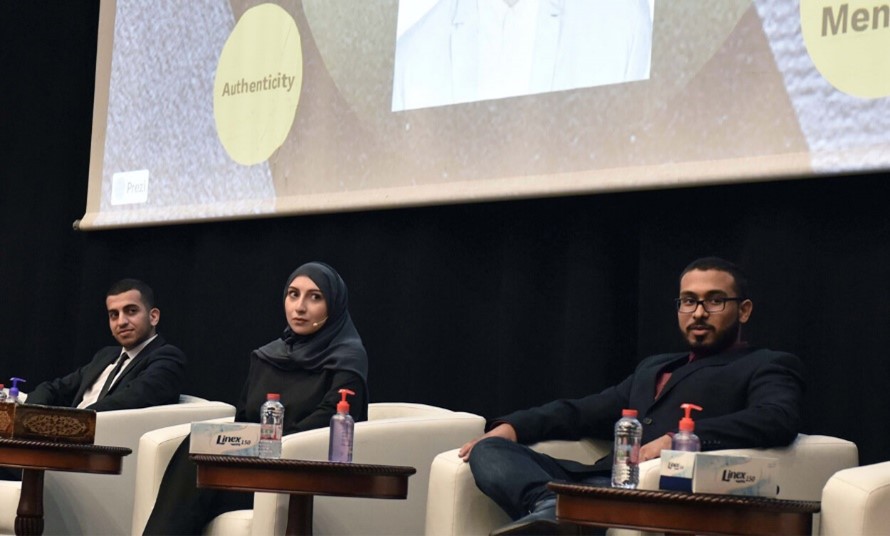
ADU recently hosted the first face-to-face peer mentoring symposium in the MENA region at its main campus. Organized to provide personal and professional development to peer mentors, the symposium targeted faculty and students from the
university. The event hosted universities from across the UAE, including, Higher Colleges of Technology (HCT – Sharjah & Abu Dhabi), Khalifa University (KU), Sorbonne University Abu Dhabi (PSUAD), The British University in
Dubai (BUiD) and the University of Sharjah (UoS). The event highlighted key topics such as ways to be an effective and motivated peer mentoring, challenges in peer mentoring, importance of interpersonal skills and the positive influence
on a mentee through mentoring.
The symposium focused on peer mentoring skills which include but are not limited to, excellent interpersonal skills, leadership, tolerance and accountability. Participants shed light on the importance of a positive attitude during peer
mentoring. Mentors should prepare themselves to handle challenges faced with mentees with an open mind and a positive attitude in instances where a mentee does not deliver on time or does not meet set expectations.
The topics were geared towards developing mentorship skills, responsibilities and practices. Leadership and growth were a particular focus of the symposium, with the aim of further developing the future leadership skills of students.
The mentees were educated on a plethora of ways in which mentors guided the students for a seamless transition into university life. The event culminated in a thought-provoking question and answer session, during which the attending
universities also shared their effective peer mentoring practices.
Furthermore, the mentors presented tips and tactics on how to overcome obstacles during peer mentoring. The mentors identified that mentoring has a positive impact on mentees as it can lead the students to a better performance when
executed correctly. In parallel, mentors with good mentoring skills will have a high competitive edge in the job market and it will increase their chances in obtaining opportunities at highly-accredited institutions.
Dr. Sreethi Nair, Dean of College of Arts and Sciences at Abu Dhabi University and founder of the Peer Mentoring Symposium, said: “The MENA region’s first peer mentoring symposium, hosted by Abu Dhabi University, was a
valuable opportunity for mentors to share ideas and best practices with counterparts from universities across the region. In line with the UAE’s Golden Jubilee, it’s of the utmost importance that we prepare for the next 50
years by inspiring our youth and empowering them to lead us into a brighter future. The symposium reinforced the UAE’s values of tolerance, cooperation, cultural diversity and effective decision making.”
Nair added: “At Abu Dhabi University, we strive to create a collaborative university environment where students can support and learn from one other, every step of the way. As a result of our synergetic academic environment, ADU
continues to graduate global citizens who in turn advance the values of multiculturalism and cross-collaboration wherever they go.”
Professor Thomas Glas-Hochstettler, Provost at ADU, commented: “Abu Dhabi University has always cultivated an academic environment where students are empowered to invest in their education while also nurturing their life skills.
As a critical element of that environment, peer mentoring programs support and connect students who are passionate about mentoring and who would like to share mentorship skills and best practices with their fellow peers. Initiatives
such as these align with ADU’s spirit of sharing and collaboration, and the peer mentoring symposium underscores squarely the importance of mentorship for all students.”
The peer mentoring symposium was met with high praise from all students in attendance. Elline Flores, a second-year aviation student at ADU, shared that the symposium imparted many valuable lessons and skills that are critical to
mentorship and future mentors. The president of the student council at ADU, Alvina Ashraf, noted that her biggest obstacle as a peer mentor was the challenge of connecting and building relationships with mentees. Alvina has learned
through the symposium that common interests between mentor and mentee are key to a more rewarding mentorship relationship.
The program aims to have an impact that extends beyond ADU’s reach and that activates future cooperation, in which universities collaborate to help their student communities through the exchange of knowledge, ideas, and best
practices.
Welcome to the Academic Success Center website
https://adugroups.adu.ac.ae/lsc/about/
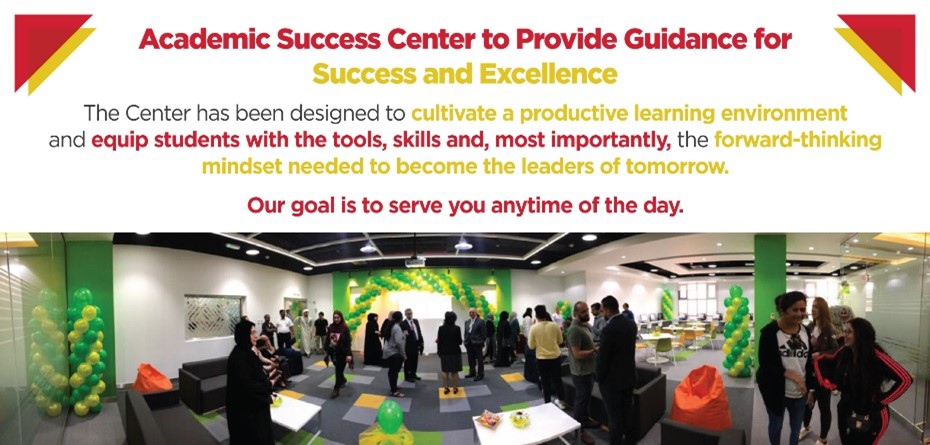
The Academic Success Center provides expert academic help for students of all majors to excel and obtain the grades they need and want.
To become effective and efficient learners, we offer these services:
- One-on-One Tutoring
- Drop-in Hours
- Group Tutoring
- Workshop and Activities
- Assistance with Research and Projects
- Problem Solving and Creative Writing
- Creating and Polishing Academic Knowledge and a lot more.
ASC is open Sunday to Wednesday from 9:00 am to 8:00 pm & Thursday 9:00 am to 6:00 pm.
All services are free of charge.Sustainable Development Goals (SDGs)
Abu Dhabi University is committed to becoming the best institution of its kind in the region. We are a private, multi-campus university committed to meeting the education, skills and knowledge needs in the United Arab Emirates and neighbouring countries through qualifications and standards that are respected across the world.
01
No Poverty
Sustained economic growth cannot be achieved without social inclusion as the whole of society has a role to play in the development of a country. Federal Law No. 13 of 1972 and its amendments by the law (No.2) in 2001 was issued by the Ministry of Community Development.
Introduction
Sustained economic growth cannot be achieved without social inclusion as the whole of society has a role to play in the development of a country. Federal Law No. 13 of 1972 and its amendments by the law (No.2) in 2001 was issued by the Ministry of Community Development.
(MOCD) as the first law to provide social benefits to members of the community to ensure and sustain the high quality of living for all UAE citizens. The Ministry continues to work today on enhancing social inclusion for all members of society where social benefits are extended to cover twenty-one segments of the community.
The UAE government has a future vision to change the culture of social support from the current ‘social welfare’ model to ‘sustainable social development’ that encourages independence and growth of families across the UAE.
ADU is determined to overcome all challenges that ADU and our students might face as a result of the poverty. We continue to be dedicated to empowering and inspiring outstanding students to pursue their goals. Our scholarships and financial aid programs are available to all students who want to fund their academic programmes. We consider it our duty to provide equal opportunities to students interested in pursuing higher education, enabling them to contribute to society regardless of their financial situation.
In additional to financial aid, ADU scholarships are being provided to outstanding students, through seven main categories, including the Sheikh Hamdan Bin Zayed Scholarship, the President’s Scholarship, the University Scholarship, the Academic Scholarship, the Athletic Scholarship, the Alumni Scholarship, and the Family Tuition Waiver.
We take pride in attracting the brightest students in the UAE and offer them generous support, to excel in their studies. Our Scholarship and Financial Aid programmes are part of ADU’s corporate social responsibility and are influenced by the UAE’s great leadership. ADU is constantly finding pioneering and innovative ways to support and facilitate the needs of our students to help them achieve their academic degree.
Emirates Red Crescent and ADU Launch a Humanitarian Funding Campaign
Emirates Red Crescent and Abu Dhabi University recently launched the Education Support Campaign in coordination with Abu Dhabi Cooperative Society and Lulu Group International. Through this collaboration, ADU and Emirates Red Crescent will support disadvantaged students in their university studies, providing them with an opportunity for a successful educational journey. The campaign aims to raise 10 million dirhams, and students will benefit from these funds starting 24 November 2021 and for one year. (This activity is licensed by the Department of Community Development – Abu Dhabi, permit number 022).
Abu Dhabi Cooperative Society and Lulu Group International will aid the campaign by facilitating donations through their different points of sale. Community members will show their solidarity by donating valuable aid to students, starting at two dirhams.
Public donations will be accepted via text message through Etisalat and Du. Bank donations can be sent to Sharjah Islamic Bank - account number (11445518006), IBAN (AE350410000011445518006). Individuals can also donate through the link provided on the Emirates Red Crescent website (https://www.emiratesrc.ae/eduadu), with the donations ranging from ten dirhams to 1,000 dirhams.
H.E. Salem Al Rayes Al Ameri, Deputy Secretary-General for Local Affairs at Emirates Red Crescent, said, "Sponsoring students is one of the permanent and continuous programs within the initiatives of the Humanitarian and Development Authority. We continue to witness a high rate of response and generosity from sponsors and benefactors. These donations are considered a true embodiment and reflection of the authority's efforts to invest in empowering individuals and guiding them towards achieving their aspirations and fulfilling their dreams."
Al Ameri added, "The Authority acknowledges the important role it plays in preparing future generations for the responsibilities of tomorrow."
Al Ameri praised the existing cooperation between the Emirates Red Crescent and Abu Dhabi University, which seeks to support education and provide opportunities to disadvantaged students whose family circumstances prevent them from continuing their educational path. The cooperation embodies Abu Dhabi University's commitment to fulfilling its social responsibility, as well as its leading academic role in advancing science and education as the most important pillars of human development in the country. He also praised the role of the Abu Dhabi Cooperative Society and Lulu International Group in supporting the activities of the campaign.
Salem Mubarak Al Dhaheri, Executive Director of Community Relations at Abu Dhabi University, said, "Abu Dhabi University is proud of its strategic partnership with Emirates Red Crescent in launching the Education Support Campaign. The campaign aligns with Abu Dhabi University's mission to support students and allows us to share social responsibilities with the community. We are proud of the continuous cooperation and renewed partnership with Emirates Red Crescent in launching campaigns that carry a noble message and achieve a tangible and real impact on our society."
Al Dhaheri added, "Abu Dhabi University appreciates the role of the Abu Dhabi Cooperative Society, Lulu International Group, and all participating partners in supporting the campaign activities. Investing in our young people and building an educated generation capable of leading the continued development of our country is vital."
Abdul Majeed Al Khouri, the Executive Director of the Abu Dhabi Cooperative Society, commented, "Our participation in the Education Support Campaign confirms the depth of the decades-old relationship between the Abu Dhabi Cooperative Society and Emirates Red Crescent. With God's grace, it has gone beyond humanitarian work and now encompasses sustainability. We are proud of this pioneering partnership. The Abu Dhabi Cooperative Society has always sought to serve the community of the UAE and we continuously contribute to helping and supporting various sectors in Abu Dhabi and the other Emirates."
Al Khoori added, "The initiatives adopted by the Abu Dhabi Cooperative Society reflect our passion towards aiding societal struggles related to education. Abu Dhabi Cooperative Society has initiated partnerships with ministries and governmental institutions, such as the Ministry of Social Affairs and the Emirates Red Crescent, to create opportunities for those who dream of pursuing their educational journey. In the last few years, we doubled our efforts and developed initiatives that will allow us to serve our country and consolidate the concept of social responsibility. We are proud to be part of an institution that provides its students with an environment that values charitable work and social development while simultaneously providing high-quality education and academic qualifications that are respected worldwide."
Mr. Aboobakker TP, Director of LuLu Hypermarkets Abu Dhabi and Al Dhafra region, said, "This initiative embodies the belief and commitment of LuLu Group in the bright future of the UAE and the power of the Emirati youth to shape it."
"Education is one of the strongest building blocks for a nation's future, and LuLu Group is honored to share in raising valuable funding for needy students," he continued. "It empowers Emirati youth to contribute to their best potential and lead the future of the country. It is particularly timely that this campaign comes on the eve of the 50th anniversary of the UAE's nationhood. We at LuLu Group International are proud of our identity as a 'homegrown' UAE brand and see this participation in the 'Let's Support Their Future' campaign as our humble contribution to the nation that gave us so much to build upon."
Sustainable Development Goals (SDGs)
Abu Dhabi University is committed to becoming the best institution of its kind in the region. We are a private, multi-campus university committed to meeting the education, skills and knowledge needs in the United Arab Emirates and neighbouring countries through qualifications and standards that are respected across the world.

